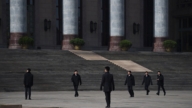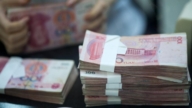【新唐人2013年06月21日讯】中共国家统计局在官方网站发布﹕广东某镇工业产值统计弄虚作假,上报数字超过真实产值近4倍,令外界感到怵目惊心。但有业内人士责问,地方政府资料造假由来已久,当局早该有所了解,为何纵容到现在才开始曝光?
6月14号,统计局发布公告显示,广东省中山市横栏镇,严重夸大了当地大型企业工业总产值的统计资料。被抽查的73家企业中,有38家规模太小,根本算不上大型企业,另外还有19家停产、搬迁或注销。此外,统计局还核查出71家企业实际为22亿多元的工业总产值,竟被当地政府虚报成85亿多元。
公告还说,横栏镇有关领导在去年5月就已经知道造假一事,却选择坐视不管。
有报导认为,这说明“数字出官,官出数字”的地方歪风,已经积重难返。
外媒则评论说,没人知道资料造假问题在大陆其他地方有多普遍。但可以肯定的是,这个问题可能已经存在多年。
美国南卡罗莱纳大学艾肯商学院教授谢田:“ 我想也许从自由世界来说,海外许多独立的媒体已经大量的、充分的曝光了中共经济造假,实际上造假从江泽民时代开始登峰造极,到前任的胡锦涛时代都一直在进行。”
还有金融专家指出,地方资料造假成风,虚报数字严重夸大,中央不可能一无所知,却依然将地方财政收入的高低作为提拔晋升官员的主要参考,纵容了造假思想的蔓延,甚至一些地方政府彼此间打起“泡沫战”和“间谍战”,中央依然熟视无睹,直到现在“地方统计造假”对中国经济产生了巨大负面影响,才开始亡羊补牢,但为时已晚,因为政府公信力已经丧失殆尽。
谢田﹕“中国政府现在一反常态,曝光地方政府虚报经济数据,我猜测,也许是新的领导人可能不愿意继续背负这个数据造假的黑锅。以前现任总理李克强也曾经跟美国人承认,就是他根本自己都不相信中国自己的数据。是不是现在把造假的东西推给前任,慢慢让其曝光,然后让经济真正的组成秩序暴露出来,或者揭示出来,这个我们还不能够完全确认,但至少也许这是趋势。”
虽然从去年3月开始,统计局掀起了一阵“统计打假”风暴,连续通报了重庆永川区、山西河津市、甘肃玉门市、福建建瓯市等四个地方的资料造假,但最终雷声大,雨点小,最高处罚不过是行政处分,连开除处分都极其少见。因此,有评论认为,地方统计造假与问责乏力也有很大关系。
曾经发表文章《时下中国十大迷思》(10 China Myths for the New Decade)的美国传统基金会研究员史剑道(Derek Scissors)博士,过去曾经说过﹕中国经济快速增长的原因无他,就是数据造假,但却误导众人。
谢田﹕“不管怎么说,真相大白是大势所趋,不管是经济真相,很可能涉及到中国的社会真相、中共迫害的真相,许许多多真相可能都在慢慢的揭示出来,也许我们从经济上先看到了最新的势头。”
美国《华尔街日报》评论表示,最好不要对中国经济资料太信以为真。无论是通胀、工业增加值还是能耗和国际贸易,所有资料似乎都与看到的情况不相符,如果参照其他指标,有些资料甚至难以站得住脚。而人为夸大经济数据,可能会令全国各地的企业和地方政府,在评估经济减速对他们的影响方面,难上加难。
采访/常春 编辑/张天宇 后制/李智远
**********************************
Local Authorities Falsification of Economic Data Exposed
China’s National Bureau of Statistics (NBS)
has released a statement on its official website.
It says that the local Chinese Communist Party
(CCP) authorities of a town in Guangdong province
have falsified local industrial output figures.
The fraudulent figure put forward was
four times the actual amount of output.
Some industry insiders have asked if local authorities’
economic data falsification has existed for very long.
The CCP central authorities are supposed to
have been aware of it early.
Why have they condoned the fraudulent practice
over years and, only now begun to expose it?
On June 14, the latest NBS bulletin reported on the
falsification of economic data by local authorities
of Henglan, a town in Zhongshan city.
Among a sample of 73 local “large” enterprises,
38 are actually very small firms.
Another 19 had either stopped production,
moved away, or had ceased to exist.
Also, 71 enterprises were found with an actual
industrial output of 2.2 billion yuan,
this figure, however, suddenly increased and
was recorded as 8.5 billion yuan by local authorities.
The official statement said that Henglan’s leaders had
been aware of the falsehood as early as in May 2012.
However, they simply sat back and did nothing about it.
Media have reported that this exposes a chronic habit
among China’s official communities, that has been impossible to stamp out.
The habit is, “Figures determine officials’ positions,
and officials habitually invent figures.”
Foreign media have reviewed that no one knows
how commonplace data fabrication is across China.
But what is certain is that the problem may have
existed for many years.
(Prof. Univ. of South Carolina-Aiken) Xie Tian:
“Overseas independent media have given ample
coverage of data fraud by CCP authorities.
It actually peaked during the tenure of Jiang Zemin,
and continued to exist in the era of Hu Jintao.”
Some financial experts say that it is impossible that
the CCP central has known nothing about
rampant economic data fraud at local levels.
Yet local fiscal revenue has still been used
as a primary indicator in official promotion.
The experts think that this has fuelled
the fraudulent practice in China.
Some local regions’fiscal revenues have been
intentionally exaggerated,
whilst the CCP central still turns a blind eye to it.
Until now, local statistical fraud has created a hugely
negative impact on China’s economy.
But it is too late to remedy, according to comments,
as the CCP regime has lost all credibility.
Xie Tian: “China’s authorities are now
changing all of a sudden.
They have begun to expose local authorities’
falsification of economic data.
I speculate that this is because the new CCP leaders
don’t want to continue to bear guilt for falsified statistics.
Even Premier Li Keqiang once admitted to America
that he himself doesn’t trust official data.
We cannot be entirely sure of the real intention
behind this official exposure.
It may be either to pass the blame for
falsification on their predecessors,
or it may simply be to expose the truth.
But at least it seems to be a trend.”
In March 2012, the NBS started a campaign
to combat the manipulation of statistics.
It has exposed data falsification by the four local
authorities of Chongqing, Shanxi, Gansu and Fujian.
Consequently, the maximum punishment imposed
on implicated officials, has been administrative sanction.
Media have commented that continuing local statistical
fraud has much to do with a weak accountability system.
Dr. Derek Scissors is a senior research fellow
at the Heritage Foundation.
In an article, he said, “There are lies and damned lies;
then there’s China’s GDP data!”
“Exaggerating Chinese prowess and emphasizing
the wrong issues leads to general mistakes…”
Xie Tian: “Anyhow, the truth will eventually out,
which is an unavoidable end to the story.
And I believe that the economic truth is likely to
spill more truths that remain covered-up in China,
such as the truth about society itself and about
the CCP’s persecution of scapegoat groups.
The sign may have just made an appearance
in the economic situation first.”
The Wall Street Journal has commented that
“It’s typically advisable not to accept Chinese
economic data at face value.
Figures on everything from inflation and industrial
output to energy consumption and international trade
often don’t seem to gel with observation and
sometimes they struggle to stack up and tally
when compared with other indicators.”
Also, the article warns that “artificially inflated figures
always further complicate efforts by companies
and governments everywhere to gauge
what that slowdown means for them.”






























